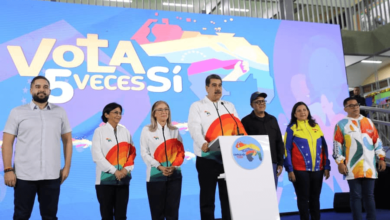As Venezuelans prepare to go to
the polls Sunday for the parliamentary elections, thousands of supporters of
the PSUV, the Venezuelan Unified Party for Socialism, have mobilized in rallies
before the campaigning ends at midnight tonight.
 In contrast to the February 2009 referendum that resulted in defeat, this year’s elections have seen strong mobilization of progressive forces to defend Venezuela’s Bolivarian Revolution. |
Campaigning is not allowed during
the two days immediately preceding the Sunday elections. The PSUV is hopeful that
it can win 110 of the 165 parliamentary seats—a two-thirds margin—to continue
its economic and social project without the blocking tactics of the right wing.
Some 17.5 million adults of Venezuela’s population of 28 million are registered
to vote.
On Sept. 19, President Hugo
Chávez explained what is at stake, “The imperialists, in their desire to regain
their domination of Venezuela and convert our homeland once again into a [U.S]
colony, has again launched its offensive to try to occupy the National Assembly
with its lackeys, with its fifth column, and then from there, block, hold back
and weaken the Government and the Bolivarian Revolution, with the aim of
defeating it by any means before the current presidential term ends or before
the December 2012 elections.”
Since Chávez’s first
presidential victory in 1999, several referenda backed by strong popular vote,
have enabled the government to institute radical changes such as nationalization
of the petroleum industry and the ability to expropriate land and companies.
Parliamentary elections are
held every five years. In 2005, the opposition declared a boycott and withdrew
their candidacies amidst a very weak showing. As a result the National Assembly
was almost unanimously supportive of President Chávez’s progressive reforms.
But since then, U.S. government
funding and advisors have worked to shape up the opposition, in order to
challenge the pro-revolution forces in the National Assembly elections.
Meanwhile the right-wing
opposition to Chávez and the Bolivarian revolution has coalesced in the Democratic
Unity Coalition (Mesa de la Unidad Democrática, or MUD), which is backed by
corporate owners like El Nacional newspaper owner Miguel Henrique Otero.
The right-wing media has tried
to increase discontent by focusing on social problems that have been improved
considerably since Chávez first took office in 1999, but which still remain.
For example, Caracas has one of the highest murder rates in Latin America, with
weekend killings sometimes running into the dozens. As a lead-up to the
elections, El Nacional ran a large front-page picture of bodies lined up in a
morgue, which the government denounced as a scare tactic.
The U.S.-backed opposition
sensationalizes such news to obscure the real developments: the government’s
continuing revolutionary projects that have greatly improved the lives of the
working class and the poor.
Counter-revolutionary
organizations such as Súmate and Justicia Primero have received millions of
dollars from U.S. government organizations like U.S. Agency for International
Development. A Súmate candidate in the Sept. 26 elections, Maria Corina
Machado, was one of the signers of the 2002 decree by the coup government of
Pedro Carmona. The coup fell apart as the Venezuelan masses poured into the
streets, and Chávez was restored within 48 hours.
Venezuelan-American attorney and
activist Eva Golinger has extensively documented U.S. imperialism’s
interventionist policies in Venezuela. Golinger wrote recently: “In 2003, USAID funded 66
programs in Venezuela. Today, this figure has grown to 623 with more than $20
million.”
Polls show the PSUV ahead, but
the key will be in the turnout. In the Feb. 2009 elections, a referendum promoted
by the revolutionary forces that sought over 65 constitutional and other
changes, was defeated because of the low voter turnout. The main problem was a lack of
mobilization by popular forces. This time pro-Bolivarian unions and community
organizations, and PSUV squads are urging the public to turn out to defend the
Bolivarian socialist project.






